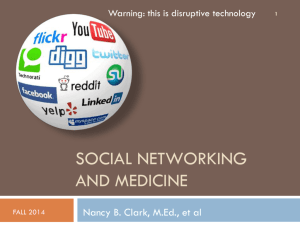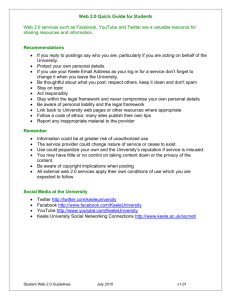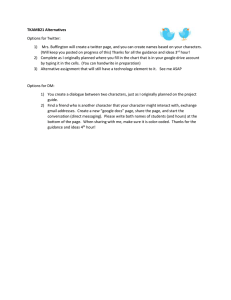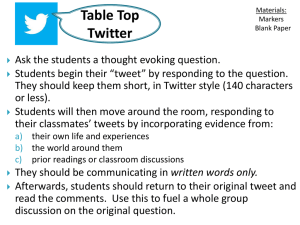SOCIAL MEDIA AND MEDICINE Nancy B. Clark, M.Ed., et al
advertisement
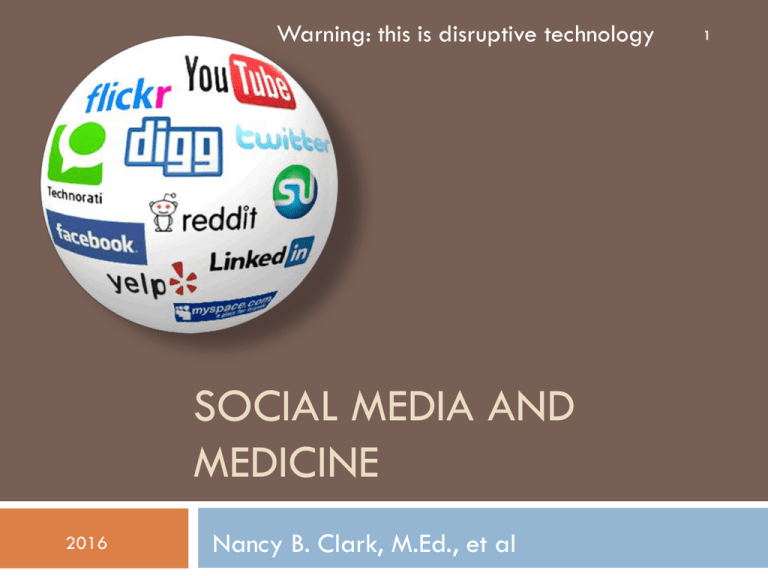
Warning: this is disruptive technology SOCIAL MEDIA AND MEDICINE 2016 Nancy B. Clark, M.Ed., et al 1 Thank You 2 Thanks to all the people who helped put together this workshop: Martin Wood –Director Medical Library Mark Strickland – MD (Psychiatry) Terri Johnson – Medical Informatics Librarian Debralee LaSeur – Medical Education Amy Griffith – Branding Expert Rob Campbell – MD (FM) Asst Dean Student Affairs Doug Meuser – MD (FM) Orlando FM Clerkship Director Cynthia Samra – MD (Peds) Sarasota Informatics Director Robyn Rosasco – Medical Library Handouts 3 PowerPoint Handout of links to resources Evaluation Resources are online at http://med.fsu.edu/informatics ...Workshop Resources Objectives for Session 4 Define social media. Name the (this week’s) major social media sites and apps and describe their uses and users List some ways patients use social media and benefits for them List some medical uses of social media by clinicians Articulate some strategies to protect your professional reputation Identify guidelines on the use of social media by physicians How can we best prepare medical students to practice in the digital age. Disclaimer 5 No monetary relationship with any of the sites, companies, (except FSU), or people mentioned in this presentation Ambivalent about some social media sites, uses, etc. Not an expert Personal user (Want to see pictures of my grandkids?) What is Social Media? 6 Digital word of mouth “A group of Internet-based applications that build on the ideological and technological foundations of Web 2.0, and that allow the creation and exchange of user-generated content.“ Kaplan, Andreas M. and Michael Haenlein . "Users of the world, unite! The challenges and opportunities of social media," Business Horizons, 2010, 53 (1), 59 - 68 Electronic communication through which users create online communities to share information, ideas, personal messages, and other content. Federation of State Medical Boards. Model policy guidelines for the appropriate use of social media and social networking in medical practice. April 2012. Major Social Media Sites and Uses 7 Facebook: “I peed.” (social networking) Youtube: “Look at this pee!” (video) Twitter: “I need to pee.” (microblog) Linkedin: “I am good at peeing.” (business networking) Foursquare: “This is where I peed.” (location) Fluid and constantly changing based on new technology, websites, etc. All have mobile apps. Glossary of Social Media Terms: http://www.socialbrite.org/sharing-center/glossary/ How often do you use social media? 8 1. 2. 3. 4. Daily Weekly Monthly Seldom or never 0% 1. 0% 2. 0% 3. 0% 4. Personal vs Professional 9 Physician use social media for personal reasons at the same rate as general public (Pew) This workshop will focus on uses of SM for professional reasons Are you an active user of …. 10 1. 2. 3. 4. 5. 6. 7. 8. A Blog Doximity Facebook Linked-In Twitter YouTube Other None Chose all that apply 0% 0% 0% 0% 0% 0% 0% 1. 2. 3. 4. 5. 6. 7. 0% 8. Adult Social Media Use by Site 11 40% of cell phone owners use social networking via their phone, and 28% do so daily. Source: Pew Research Center’s Internet & American Life Project Surveys. All surveys of adults 18 and older. Available at http://www.pewinternet.org/2015/08/19/mobile-messaging-and-social-media-2015-main-findings/ Major Social Media Sites #s 12 Facebook: 1.55 B+ monthly users YouTube: 1B+ monthly users (YouTube, 2016) Twitter: 334M+ active users (Jan 2015) LinkedIn: 313M+ users Google+: 540M+ monthly users Pinterest: 100 M active users http://www.internetlivestats.com/ (LinkedIn, Oct 2014) (Jun 2015) Privacy Settings Issues 13 Facebook – set privacy levels, if you know how YouTube – set some privacy, usually open, allow or block comments Twitter – set privacy, lock tweets for friends only, block people Google+ -- put people in circles, set privacy within circles “We need to be as professional on the Web as we are face-to-face with a patient, and we always need to be aware of HIPAA rules. When you use any form of social media, ask yourself before you hit the send button: if I were in a crowded hospital elevator and I said aloud what I just wrote for a social media network, would that be OK? If the answer no, don’t post it!” Kevin Pho Facebook 14 YouTube 15 http://www.youtube.com/fsumedmedia Twitter 16 The Anatomy of a Tweet 17 “Tweet” Members send and read text-based posts of up to 140 characters (Tweet, n or v) The Anatomy of a Tweet 18 "#“ Hashtag. Group posts by topic or type – words or phrases prefixed with a "#" sign. #obesity #Medicine #healthcare #HCSM #Health20 #meded #mHealth http://www.symplur.com/healthcare-hashtags/ "@" sign followed by a username is used for mentioning or replying to other users @MD_chat @HarvardHealth “Retweet“ To repost a message from another Twitter user, and share it with one's own followers, the retweet function is symbolized by "RT" in the message. URL shortener – bit.ly tinyurl.com bit.ly/JQKt9L Tweet Chats: scheduled chats about a subject. Live Surgical Tweets 19 Physician’s Guide to Getting Started on Twitter http://www.slideshare.net /bestdoctors/aphysicians-guide-totwitter-12776591 Does your practice/hospital participate in social media? 20 0% 0% w 0% Do n’ tk no C. No B. Yes No Don’t know Ye s A. Healthcare Institutions on #HCSM 21 Major Associations on #HCSM 22 Journals on #HCSM 23 Government Agencies on #HCSM 24 #zika on #HCSM 25 Twitter Youtube Facebook LinkedIn 26 Pinterest 27 Sharing 28 “Thank you for sharing” …or not Physician’s Guide to Using FB, Twitter, LI 29 Pennsylvania Academy of Family Physicians Guide to Social Media Advanced Guide now available. Includes setting up a Blog at Wordpress.com http://bit.ly/1yDwkIv Medical Student’s Use of SM 30 Class of 2018 incoming survey: 86% have a active account at Facebook, Twitter or LinkedIn 96% upload images to Flickr or Facebook 78% upload videos to YouTube 65% contribute to a wiki or blog 97% Uses Skype or FaceTime to do video/voice communications N=119 31 How would you handle/have you handled a request from a student inviting you to be their Facebook ‘friend’?” A. B. C. D. Accept Decline/Decline until student graduates Ignore the request Other 0% A. 0% B. 0% 0% C. Metzger, AH, et al. Pharmacy faculty members’ perspective on the student/faculty relationship in online social networks. Am J Pharm Educ. 2010. 74(10); 188. D. Student Social Media Professionalism 32 Emphasized from first day Dr. Campbell’s curriculum during orientation Students mostly use for personal reasons Cautioned that residency directors look at FB pages Warned of permanence of posted media Cautioned to protect professional reputation – live it Defines “inappropriate behavior” posted online Urged to use privacy settings to limit access Dr. Campbell on Social Media 33 http://www.youtube.com/watch?v=hqz3cvVkcMQ Rob Campbell, MD, Assistant Dean for Student Affairs, FSU CoM AAMC Digital Literacy Initiative 34 https://www.aamc.org/members/gir/resources/359492/digitalliteracytoolkit.html Patient Medical Use of SM 35 SM is the new word-of-mouth for picking a doctor Find a local doctor, read and write reviews of doctors, practice, hospitals Find health information Find support groups for chronic disease and other health issues Are your patients using social media? 36 0% w 0% Do n’ tk no 0% e 0% No n D. Fe w C. an y B. Many Few None Don’t know M A. Social Media and Informal Support Groups 37 Chronic Disease support groups Awareness, support, education Community of bloggers Lifestyle and health maintenance support Diet plans, track exercise … Caregiver social support groups Caregivers disease for elderly, family members with chronic Diabetes, as an Example 38 Social Media for Chronic disease • Awareness • Support • Education Diabetes Hands Foundation. http://www.tudiabetes.org Some Examples of Sites 39 Cancer Survivors Network – www.csn.cancer.org Fibromyalgia – www.LivingWithFibro.org Multiple Sclerosis – www.msconnection.org Cancer – www.whatnext.com Type 1 Diabetes – www.typeonenation.org Leonard, K, et al. “Moderated Social Media Support Groups for Patients,” Journal of Consumer Health on the Internet. 2015. http://dx.doi.org/10.1080/15398285.2015.1089397 The Power of an Online Community of Patients 41 http://www.youtube.com/watch?v=BnKqco8G7t4&feature=plcp Martin Wood, Director of the Maguire Medical Library Peer-to-peer Healthcare 42 One in four internet users living with high blood pressure, diabetes, heart conditions, lung conditions, cancer, or some other chronic ailment (23%) say they have gone online to find others with similar health concerns. By contrast, 15% of internet users who report no chronic conditions have sought such help online. Fox, Suzannah. Peer-to-peer Healthcare. Pew Internet Survey Results. http://pewinternet.org/Reports/2011/P2PHealthcare.aspx https://www.youtube.com/user/PatientsLikeMe2008 Patients Like Me 43 Grief and Community Support 44 Caring Bridge Inspire.com Jacobs, DL. Turning to Social Media in Times of Need. New York Times. May 13, 2015 Tracking Health Data 45 • Fitbit sold 4.8 million wearables in the third quarter 2015. Fitbit Community includes help forums, activity groups and discussions. 60% of U.S. adults track weight, diet, or exercise routine. (Pew) 21% use some form of technology to track their health data 46% of trackers say that this activity has changed their overall approach to maintaining their health or the health of someone for whom they provide care. How to Find Communities 46 Google a condition and “social media communities”, “Blog” etc. Go to a major social media site and search on a disease/condition Check out www.Inspire.com - communities www.BensFriends.org, Patient Support Communities – look under Community List Health Information Online 47 80% of internet users gather health information online (Pew) Educate patients to find good information online List reliable sites on your clinic web site Social media provides physicians opportunities to contribute to good information online In your Twitter posts, FB page, or Blog Recommend sites, good articles, good blogs on topics you see often or questions you answer often As a patient, have you used social media to address a health question? 48 0% 0% No B. Yes No Ye s A. Rheumatoid Arthritis 49 http://bit.ly/MgNS8t 50 For which of the following Enter Question Text reasons might you recommend a social media site to a patients? A. B. C. D. E. F. G. Patient education Caregiver support Peer-to-peer support Healthy lifestyle support Find community health resources Other Nothing Pick up to 6 0% 0% 0% 0% 0% 0% A. B. C. D. E. F. 0% G. Manage your Reputation 51 https://www.youtube.com/watch?v=-XhH1-NMPHI Your Online Reputation 52 Multiple sites contain physician demographics, certifications, credentials, actions… Allow patient reviews Healthgrades.com Experience AngiesList.com Ease of scheduling appt. Google Plus Local (maps) Wait times Vitals.com Zocdoc.com Staff friendliness …and many more Would they recommend to friend Physician Establishing, Managing, and Protecting Your Online Reputation: A Social Media Guide for Physicians and Medical Practices by Kevin Pho M.D., Susan Gay Patients Share Experiences 53 Patient reviews mostly positive…… Encourage your good patients to post review “You have no control over what other people say about you, but you have total control of the content you create about yourself and your practice.” Kevin Pho Dealing with Patient Reviews 54 Monitor patient comments about you Respond to comments in compassionate, thoughtful way Calmly and thoughtfully suggest alternative points of view Consider opinions -- not dismiss them as irrelevant/incorrect Avoid online confrontation – let administrator contact patient to deal with concerns Campbell, KR. Doctors: Social media strategies to manage our identity online. August 2012. www.kevinmd.com/blog/2012/08/doctors-social-media-strategies-manage-identity-online.html What is Astroturfing? 55 The practice of masking the sponsors of a message or organization (e.g., political, advertising, religious or public relations) to make it appear as though it originates from and is supported by grassroots participant(s). In medicine, posting fake positive reviews. Prosecutions have resulted: Lifestyle Lift and San Francisco Plastic Surgical Center. Google Plus Local 56 Manage Your Google Rep 57 Claim your listing. Search Google Places by your telephone number, then claim your listing(s). Need Google account (Gmail). Delete duplicate listings. Do not use the same phone number for multiple locations. 2. Complete your listing. Fill out profile completely. Add link to website and practice description. Use keywords that relate to practice or specialty. Google Places shows your profile completion rate. 100% most effective. 3. Update: Reviews in Google+ Local. No longer anonymous. Good for businesses, bad for healthcare. 4. Google recognizes up to date profile and active participation in listing and uses this when calculating rank. 1. Establishing, Managing, and Protecting Your Online Reputation: A Social Media Guide for Physicians and Medical Practices Hire a Reputation Mgmt Firm 58 To insure consistent and factual information about you and your practice Remove any unwanted information from online resources Suggestions for selecting a firm: Verify their credibility Get a referral Check out their work Know what you are paying for Kevin Pho Physician Use of SM 59 Market practice and recruit patients Identifying services patients desire Connect with other doctors Connect with patients Keep up to date with health news, technology’s impact on health and the delivery of healthcare Recruit research subjects Connecting with other doctors 60 http://www.youtube.com/watch?v=xL85FlmbI_4 doximity.com The Private Network for Physicians. Med Students. Convenient & HIPAAcompliant. Free for doctors on iPhone, Android and web. Alumni groups. Secure patient information, eFaxing, messaging. Consults. Recruiting. https://www.youtube.com/watch?v=bEmwyxaY6hw http://33charts.com/2013/08/12-things-about-doximity.html Connecting with Patients 61 Start with a professional Website Use Facebook account for clinic linked to Website Remind patients of Great American Smokeout, flu shots Cosmetics post success stories from patients TwitterDoctors.net – doctors who Tweet Share articles, sites, news Tweet while attending conferences Tweet when running late “…consider being on Twitter to extend your reach and impact. If however, you are concerned and hesitant about it, I would suggest a gentle progression from Twitter anonymity to community.” Levi, E. This surgeon learned the power of Twitter. KevinMD.com; June 12, 2015. Incentives 62 Patient satisfaction increases (https://cahps.ahrq.gov/) Support meaningful use efforts: Stage 2 Communicating health information to patients, electronic copy of health information upon request View and download relevant information via webbased portal within 36 hrs – use mobile apps? Integral aspect of the Patient-Centered Medical Home (PCMH) model Standards will need to be developed to do this securely HCSM and the Patient Centered Medical Home. Ben Miller. March 2012. http://smhcop.wordpress.com/2011/03/16/hcsm-and-the-patient-centered-medical-home/ Strategies for Putting SM into Practice 63 Set up Google Alerts for your name http://www.google.com/alerts Define your goals Manage online reputation, increase patient load, improve office efficiency, engage patients… Establish guidelines Determine time commitment Define your role, role of staff members Determine your message Pick a core site for presence Hire a communications professional (reputation.com) 64 What would be your goal of using Social Media professionally? A. B. C. D. E. F. G. Market Practice Improve patient satisfaction and outcomes Influence health policy Protect reputation Mentor students/residents Promote healthy lifestyle Other Pick your top 3 0% 0% 0% 0% 0% 0% A. B. C. D. E. F. 0% G. Social Media Guidelines and Policies 65 If part of larger organization, review their policy If not, develop one for your practice Make sure everyone knows the policy Contact the FSU College of Medicine Communications Office before you use social media to promote anything related to FSU College of Medicine Doug Carlson doug.carlson@med.fsu.edu or (850) 645-1255 Does your practice/clinic have a social media policy? 66 A. B. C. Yes No Don’t know 0% A. 0% B. 0% C. Guidelines on Social Media Use 67 Federation of State Medical Boards – Guidelines for Appropriate Use of Social Media… (April 2012) Connecting with patients - Do Not…interact with current or past patients on personal social media. Professional only. Connecting with other physicians – secure, HIPAA compliant sites like Doximity.com Privacy/confidentiality – HIPAA – written authorization from patients Disclosure – reveal any conflicts of interest Content Professionalism… Federation of State Medical Boards. Model policy guidelines for the appropriate use of social media and social networking in medical practice. April 2012. http://www.fsmb.org/Media/Default/PDF/FSMB/Advocacy/pub-social-media-guidelines.pdf Resources 68 FSU CoM Social Media Guidelines Mayo Clinic Center for Social Media http://www.ama-assn.org/ama/pub/physician-resources/medicalethics/code-medical-ethics/opinion9124.page CDC Health Communicator’s Toolkit http://socialmedia.mayoclinic.org/ Curriculum on Social Media - SMUG http://social-media-university-global.org/ AMA Policy: Professionalism in use of Social Media http://med.fsu.edu/index.cfm?page=COMaboutUs.socialmediaguide http://1.usa.gov/amOmMI Establishing, Managing, and Protecting Your Online Reputation: A Social Media Guide for Physicians and Medical Practices. By Kevin Pho M.D., Susan Gay. Greenbranch Publishing. 2012. http://www.kevinmd.com/blog/reputation In Summary The cat is out of the bag… 69 Critical message: Rules of offline behavior apply to online behavior where there is much wider audience Errors will occur: Develop a social media policy provide orientation and training. View mistakes as learning opportunities. There is great power in the conversation. Know the risks and behave accordingly. Do not be so risk averse that you do not participate. Dr. Farris Timimi, Medical Director of the Mayo Clinic Center for Social Media http://socialmedia.mayoclinic.org/2012/04/05/a-twelve-word-social-media-policy/
